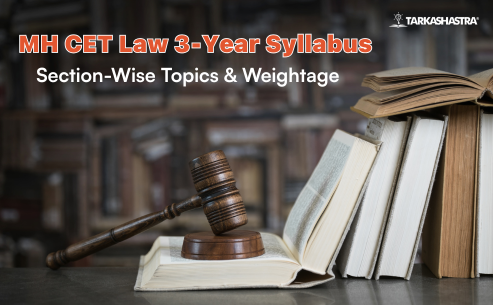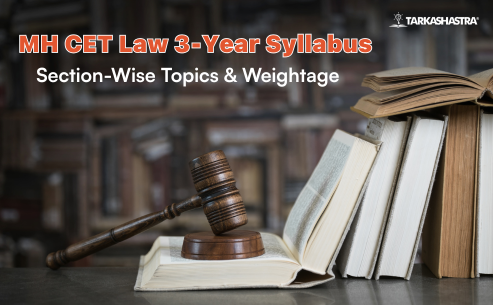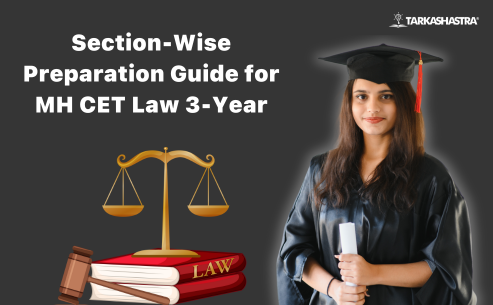The All India Law Entrance Test (AILET) 2026 is one of the most competitive law entrance exams in India, conducted annually by National Law University, Delhi (NLU Delhi). It serves as the exclusive gateway to NLU Delhi’s prestigious BA LLB (Hons.), LLM, and PhD programs, making it a dream exam for thousands of law aspirants every year.
Understanding the exam pattern is the first and most crucial step in AILET preparation. The exam does not just test rote memorization; instead, it evaluates a candidate’s reading comprehension, reasoning ability, legal awareness, and analytical depth.
Over the years, AILET has undergone significant changes — most notably, the removal of the Mathematics section post-2022, which shifted the focus entirely towards English Language, Current Affairs & General Knowledge, and Logical Reasoning.
In this detailed blog, we will break down the AILET 2026 exam pattern — including the total marks, section-wise weightage, question distribution, and marking Scheme — along with insights on expected difficulty and strategies to maximize your score.
Quick Snapshot: Why Exam Pattern Matters
| Factor | Why It’s Important |
| Total Marks & Duration | Helps you understand the scale of the exam and pace your preparation. |
| Section-Wise Weightage | Shows which sections can make or break your score (Logical Reasoning = 47%!). |
| Marking Scheme | Guides you on accuracy vs attempts, since negative marking applies. |
| Recent Changes | Knowing that Mathematics is removed saves you from wasting time on irrelevant prep. |
AILET 2026 Exam Overview
The AILET 2026 exam is designed to assess candidates on three fronts — English proficiency, general awareness, and logical aptitude — all of which are essential for building a strong foundation in legal studies. Conducted in an offline (pen-and-paper) mode, the test spans 120 minutes. It includes 150 multiple-choice questions for BA LLB aspirants.
This exam pattern ensures that aspirants are not only knowledgeable but also able to think critically and manage time effectively under pressure.
Quick Exam Details for AILET 2026 (Expected)
| Particulars | Details |
| Exam Name | AILET (All India Law Entrance Test) |
| Conducting Body | National Law University, Delhi (NLU Delhi) |
| Courses Offered | BA LLB (Hons.) |
| Exam Mode | Offline (Pen-and-Paper Based) |
| Exam Duration | 120 minutes (2 hours) |
| Total Marks (UG) | 150 |
| Number of Questions | 150 MCQs |
| Sections | English Language, Current Affairs & General Knowledge, Logical Reasoning |
| Marking Scheme | +1 for correct answer, –0.25 for wrong answer, 0 for unattempted |
| Medium of Exam | English |
Key Insight:
Unlike other law entrance exams, AILET does not include Mathematics for BA LLB. This means candidates must channel their preparation efforts into language skills, awareness of current affairs, and reasoning ability — areas that directly correlate with law studies.
AILET 2026 Important Dates
The AILET 2026 exam cycle will follow a structured schedule, starting with the release of notification in June 2025 and ending with the declaration of results in December 2025. Candidates must keep track of all deadlines to ensure they don’t miss any crucial steps in the application or exam process.
Revised AILET 2026 Schedule
| Event | Dates (Revised) |
| Release of AILET 2026 notification | June 17, 2025 |
| Release of revised AILET 2026 notification | July 22, 2025 |
| Start of online AILET application form | August 7, 2025 |
| Last date to submit the AILET 2026 application form | November 10, 2025 |
| Release of the AILET admit card | Third week of November 2025 |
| AILET 2026 Exam Date | December 14, 2025 (Revised) |
| Timing of AILET 2026 Exam | 2:00 PM – 4:00 PM |
| Release of the AILET final answer key | Second week of December 2025 |
| Declaration of AILET results | Third week of December 2025 |
Key Insight:
Since the exam is scheduled on December 14, 2025, aspirants get around four months of focused preparation after the application closes. This makes time management and structured revision crucial during the last phase.
AILET 2026 Exam Pattern and Total Marks – BA LLB (UG)
The AILET 2026 BA LLB exam is structured to test a student’s reading comprehension, awareness of current events, and logical reasoning ability. With a total of 150 questions for 150 marks, each section carries a specific weightage that can significantly influence the final score.
1. Section-Wise Distribution of Questions & Marks
| Section | Number of Questions | Marks | Weightage (%) |
| English Language | 50 | 50 | ~33% |
| Current Affairs & General Knowledge | 30 | 30 | ~20% |
| Logical Reasoning | 70 | 70 | ~47% |
| Total | 150 | 150 | 100% |
Key Takeaway:
- Logical Reasoning is the most decisive section, carrying nearly half the paper.
- English Language remains a strong scoring area if practiced regularly.
- GK & Current Affairs requires consistency but can be completed quickly during the exam.
2. Marking Scheme for AILET 2026
| Response Type | Marks Awarded |
| Correct Answer | +1 mark |
| Incorrect Answer | –0.25 mark |
| Unattempted | 0 mark |
This means 4 wrong answers cancel out 1 correct answer, making accuracy as important as attempts. Blind guessing should be avoided.
3. Nature of Questions
- All questions are objective-type MCQs.
- Designed to test comprehension, reasoning, and awareness.
- No Mathematics section (removed after 2022).
Key Insight:
Candidates who strategically balance speed with accuracy across the three sections stand a much better chance of securing a top rank. Over-reliance on one section (especially Logical Reasoning) without maintaining consistency in English and GK can reduce overall performance.
Section-Wise Breakdown
A. English Language
The English Language section of AILET 2026 is designed to test not only vocabulary and grammar but, more importantly, a candidate’s reading comprehension and interpretation skills. Since the exam is heavily oriented towards law, the ability to read, analyze, and understand passages quickly becomes a key skill.
Unlike rote-based grammar drills, this section is application-oriented — requiring candidates to interpret meaning, identify errors, and rearrange ideas coherently.
Key Areas to Focus On
| Topic | What to Expect | Importance Level |
| Reading Comprehension (RC) | Passages with inference-based, fact-based, and tone-based questions | ⭐⭐⭐⭐⭐ (High) |
| Vocabulary | Synonyms, antonyms, idioms, phrases, one-word substitutions | ⭐⭐⭐⭐ (Moderate) |
| Grammar & Usage | Sentence correction, error spotting, fill-in-the-blanks | ⭐⭐⭐⭐ (Moderate) |
| Para Jumbles | Rearranging jumbled sentences into a coherent paragraph | ⭐⭐⭐ (Low–Moderate) |
| Figures of Speech & Analogies | Contextual application of similes, metaphors, and comparisons | ⭐⭐ (Low) |
Question Types in AILET English
- RC-based MCQs → testing inference, main idea, tone, and factual details.
- Sentence correction & error spotting → ensuring strong grammar knowledge.
- Vocabulary-based direct questions → synonyms, antonyms, one-word substitutes.
- Fill-in-the-blanks → contextual grammar + vocabulary.
- Para-jumbles → logical sequencing of sentences.
Preparation Tips for the English Section
- Read editorials and opinion pieces from reputed newspapers (The Hindu, Indian Express) daily to improve comprehension and analytical vocabulary.
- Maintain a personal word bank of new words and revise weekly.
- Practice mock RC passages under time constraints to improve speed and accuracy.
- Use previous year AILET papers to understand the framing of comprehension questions.
- Focus on grammar fundamentals rather than shortcuts — error spotting is often subtle.
Key Insight:
The English section, contributing 33% of the paper, can act as a stabilizer in your score. Since RCs dominate this section, practicing speed reading and inference-based questioning is crucial.
B. Current Affairs & General Knowledge
The Current Affairs & GK section in AILET 2026 evaluates how well candidates stay updated with national and international events, legal updates, and static knowledge. Though it carries only 30 questions (~20% of the paper), it can become a rank booster since well-prepared students can solve this section quickly and accurately.
Unlike English or Reasoning, GK does not require solving lengthy passages or logical puzzles. Instead, it demands regular reading, consistent revision, and retention of factual information.
Key Areas to Focus On
| Topic | What to Expect | Importance Level |
| Current Affairs (Last 12–15 Months) | Awards, sports, government policies, economic updates, major events (national & international) | ⭐⭐⭐⭐⭐ (Very High) |
| Legal GK | Landmark judgments, constitutional amendments, new bills & laws | ⭐⭐⭐⭐ (High) |
| Static GK | Indian Polity, History, Geography, Economy, Environment | ⭐⭐⭐ (Moderate) |
| International Affairs | Global treaties, organizations, summits, international disputes | ⭐⭐⭐ (Moderate) |
| Miscellaneous | Books & authors, Science & Tech, rankings & appointments | ⭐⭐ (Low–Moderate) |
Question Types in AILET GK & CA
- MCQs on recent events → awards, appointments, government initiatives.
- Legal awareness questions → linking current affairs with law (e.g., constitutional amendments, new bills).
- Static GK → straightforward fact-based questions from history, polity, and geography.
Preparation Tips for GK & Current Affairs
- Dedicate 15–20 minutes daily to newspapers (The Hindu, Indian Express).
- Use monthly current affairs compilations for revision (the last 12–15 months are crucial).
- Follow legal updates → Supreme Court/High Court judgments, key government bills.
- Revise static GK weekly using short notes for quick recall.
- Attempt sectional quizzes to reinforce memory under time limits.
Key Insight:
Although this section has only 30 questions, it requires minimal time in the exam. It can free up extra minutes for Logical Reasoning. Consistency in preparation is the only way to ace this section — cramming at the last moment rarely works.
C. Logical Reasoning
The Logical Reasoning section is the game-changer in AILET 2026. With 70 questions worth 70 marks (~47% of the paper), this section alone can decide whether a candidate secures a seat at NLU Delhi.
It tests both Analytical Reasoning (puzzles, arrangements, patterns) and Critical Reasoning (assumptions, conclusions, strengthen/weaken arguments). Unlike GK, this section requires problem-solving ability under time pressure, making practice and accuracy extremely important.
A. Analytical Reasoning (Problem-Solving)
| Topic | What to Expect | Difficulty Level |
| Puzzles & Arrangements | Linear/circular seating, grouping, scheduling | ⭐⭐⭐⭐ Moderate–High |
| Series & Coding-Decoding | Number/letter series, symbol-based codes | ⭐⭐⭐ Easy–Moderate |
| Blood Relations | Family tree problems, coded relations | ⭐⭐ Easy |
| Direction Sense | Distance, orientation, movement-based problems | ⭐⭐ Easy |
| Ranking & Ordering | Position, order, and hierarchy-based problems | ⭐⭐⭐ Moderate |
| Syllogisms & Venn Diagrams | Statement-based deductions | ⭐⭐⭐ Moderate |
B. Critical Reasoning (Argument Evaluation)
| Topic | What to Expect | Difficulty Level |
| Assumptions & Conclusions | Identify hidden assumptions, logical outcomes | ⭐⭐⭐⭐ Moderate–High |
| Strengthen/Weaken Arguments | Choose statements that support/undermine arguments | ⭐⭐⭐⭐ High |
| Cause & Effect | Determine logical implications and correlations | ⭐⭐⭐ Moderate |
| Statement & Inference | Drawing valid conclusions from statements | ⭐⭐⭐⭐ High |
| Assertion & Reason | Test logical consistency of given statements | ⭐⭐⭐ Moderate |
| Critical Reading | RC-style passages requiring argument analysis | ⭐⭐⭐⭐ Moderate–High |
Question Types in AILET Logical Reasoning
- Multi-step puzzles and seating arrangements.
- Cause-effect and assumption-based inference questions.
- Strengthen/Weaken questions from legal or real-world scenarios.
- Syllogisms and statement-based deductions.
- Critical RC passages require deeper reasoning.
Preparation Tips for Logical Reasoning
- Dedicate 50% of preparation time to this section since it carries maximum weightage.
- Practice puzzles and arrangements daily under timed conditions.
- Focus on critical reasoning topics (assumptions, strengthen/weaken, inference) as they are newer and more challenging for most aspirants.
- Solve previous year AILET papers to spot recurring reasoning patterns.
- Attempt mock tests with sectional analysis to improve accuracy + time management.
Key Insight:
This section is moderate to difficult. While analytical reasoning can be mastered with practice, critical reasoning requires conceptual clarity and consistent exposure to different argument structures. Success in AILET largely depends on performance in this section.
AILET 2026 Marking Scheme in Detail
The marking scheme of AILET 2026 is designed to test not just knowledge but also accuracy and decision-making under pressure. Every correct answer adds to your score, while every wrong answer reduces it. This makes strategic attempts critical — guessing blindly can harm your overall performance.
Marking Rules
| Response Type | Marks Awarded |
| Correct Answer | +1 mark |
| Incorrect Answer | –0.25 mark |
| Unattempted Question | 0 mark |
Impact of Negative Marking
- For every 4 wrong answers, you lose 1 full mark.
- Example: If you attempt 100 questions and get 70 correct, 30 wrong →
- Correct = +70
- Wrong = –7.5 (30 × 0.25)
- Final Score = 62.5 instead of 70.
Key Strategy for Handling Marking Scheme
- Avoid blind guessing → Random attempts can drag your score down quickly.
- Use elimination method → Narrow down options to 2 choices before attempting.
- Balance attempts with accuracy → It’s better to attempt 120 with 85% accuracy than all 150 with 60% accuracy.
- Prioritize high-confidence questions → Secure marks first, then revisit doubtful ones.
Key Insight:
In AILET, accuracy is as important as speed. Unlike exams without negative marking, where more attempts may help, here, a reckless strategy can push your score below the cut-off. A brilliant selection of questions is the key to success.
Time Management Strategy (Exam Day)
| Section | Ideal Time Allocation | Tips |
| English Language (50 Qs) | 30–35 minutes | Read RC questions first, then passages; avoid overthinking vocab. |
| Current Affairs & GK (30 Qs) | 10–15 minutes | Attempt quickly, don’t linger on tough factual Qs. |
| Logical Reasoning (70 Qs) | 60–65 minutes | Prioritize easier analytical Qs before tackling critical reasoning. |
| Review & Correction | 5–10 minutes | Re-check high-confidence Qs to improve accuracy. |
Key Insight:
- Logical Reasoning is the rank-decider (70 marks). Spend at least half your preparation time here.
- GK is a quick booster if prepared consistently — it saves time during the exam.
- Balanced preparation is crucial: over-focusing on one section while neglecting others can lower your overall score.
Conclusion
The AILET Exam Pattern 2026 highlights why this test is considered one of the toughest law entrance exams in India. With 150 questions in 120 minutes, the exam is not just about knowledge but also about speed, accuracy, and strategy.
- Logical Reasoning (70 marks, ~47%) → the ultimate rank-decider.
- English Language (50 marks, ~33%) → a strong scoring opportunity with consistent practice.
- Current Affairs & GK (30 marks, ~20%) → a time-saver and quick booster, provided candidates follow daily and monthly updates.
- Negative marking (–0.25) makes accuracy as important as attempts.
- AILET is reasoning-heavy with limited seats, demanding a sharper focus.
At Tarkashastra, we ensure aspirants don’t just study harder but study smarter. With:
- Expert-curated AILET e-Books & hard copy materials
- Sectional tests and full-length mocks replicating the real exam pattern
- Detailed performance analysis with AI-driven feedback
- Mentor-led sessions focused on reasoning and strategy
…our students are equipped with the exact tools needed to ace AILET and secure their place at NLU Delhi.
With the right preparation plan and discipline, AILET 2026 can be conquered. Start early, stay consistent, and let strategy drive your preparation journey.
Frequently Asked Questions (FAQs) on AILET Exam Pattern 2026
1. What is the AILET 2026 exam pattern for BA LLB?
AILET 2026 consists of 150 multiple-choice questions divided into three sections — English Language, Current Affairs & General Knowledge, and Logical Reasoning. The exam is 120 minutes long and carries 150 marks in total.
2. How many questions are asked in AILET 2026?
The BA LLB exam will have 150 questions in total. These include 50 from English, 30 from GK & Current Affairs, and 70 from Logical Reasoning.
3. What is the marking scheme for AILET 2026?
Each correct answer carries +1 mark, while each incorrect answer deducts -0.25 marks. No marks are deducted for unattempted questions.
4. Which section carries the maximum weightage in AILET 2026?
Logical Reasoning carries the maximum weightage with 70 questions worth 70 marks, making up nearly 47% of the paper.
5. What is the duration of the AILET 2026 exam?
The exam duration is 120 minutes (2 hours). Candidates must complete 150 questions within this time.
6. What type of questions are asked in the English section?
English includes comprehension passages, grammar corrections, vocabulary questions, and para jumbles. Most questions test interpretation skills.
7. What kind of GK questions appear in AILET?
GK includes a mix of static questions (history, polity, geography) and current affairs from the last 12–15 months. Legal GK also plays a role.
8. How should I prepare for the Current Affairs section?
Read newspapers daily, revise monthly current affairs booklets, and track Supreme Court judgments and government policies regularly.
9. How is AILET different from CLAT?
AILET focuses heavily on Logical Reasoning, while CLAT emphasizes Legal Reasoning. Also, AILET offers admission only to NLU Delhi.
10. What is the exam pattern for AILET PG 2026?
The AILET PG 2026 exam consists of 100 multiple-choice questions (MCQs), each carrying 1 mark, with a penalty of 0.25 marks for every incorrect answer. The test is law-oriented, covers core legal subjects, and must be completed within 120 minutes (2 hours).
11. Which newspapers are best for AILET preparation?
The Hindu and The Indian Express are the best choices. They help improve comprehension, vocabulary, and awareness of legal and current affairs.
12. Does AILET have sectional time limits?
No, there are no sectional time limits. Candidates can divide time as per their strengths and weaknesses across sections.







